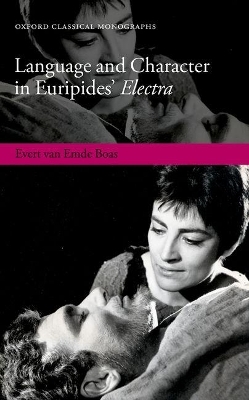
Language and Character in Euripides' Electra
Seiten
2017
Oxford University Press (Verlag)
978-0-19-879360-1 (ISBN)
Oxford University Press (Verlag)
978-0-19-879360-1 (ISBN)
This study of Euripides' Electra marries linguistics and literary criticism to provide novel insights into the interpretation of the play. Focusing on characterization, it demonstrates how the figures are shaped through their use of language, using new means of analysis to argue for a balanced interpretation and challenge prevailing views.
This study of Euripides' Electra approaches the text through the lens of modern linguistics, marrying it with traditional literary criticism in order to provide new and informative means of analysing and interpreting what is considered to be one of the playwright's most controversial works. It is the first systematic attempt to apply a variety of modern linguistic theories, including conversation analysis, pragmatics, sociolinguistics (on gender and politeness), paroemiology, and discourse studies, to a single Greek tragedy.
The volume focuses specifically on issues of characterization, demonstrating how Euripides shaped his figures through their use of language, while also using the same methodology to tackle some of the play's major textual issues. An introductory chapter treats each of the linguistic approaches used throughout the book, and discusses some of the general issues surrounding the play's interpretation. This is followed by chapters on the figures of the Peasant, Electra herself, and Orestes, in each case showing how their characterization is determined by their speaking style and their 'linguistic behaviour'. Three further chapters focus on textual criticism in stichomythia, on the messenger speech, and on the agon.
By using modern linguistic methodologies to argue for a balanced interpretation of the Electra's main characters, the volume both challenges dominant scholarly opinion and enhances the literary interpretation of this well-studied play. Taking full account of recent and older work in both linguistics and classics, it will be of use to readers and researchers in both fields, and includes translations of all Greek cited and a glossary of linguistic terminology to make the text accessible to both.
This study of Euripides' Electra approaches the text through the lens of modern linguistics, marrying it with traditional literary criticism in order to provide new and informative means of analysing and interpreting what is considered to be one of the playwright's most controversial works. It is the first systematic attempt to apply a variety of modern linguistic theories, including conversation analysis, pragmatics, sociolinguistics (on gender and politeness), paroemiology, and discourse studies, to a single Greek tragedy.
The volume focuses specifically on issues of characterization, demonstrating how Euripides shaped his figures through their use of language, while also using the same methodology to tackle some of the play's major textual issues. An introductory chapter treats each of the linguistic approaches used throughout the book, and discusses some of the general issues surrounding the play's interpretation. This is followed by chapters on the figures of the Peasant, Electra herself, and Orestes, in each case showing how their characterization is determined by their speaking style and their 'linguistic behaviour'. Three further chapters focus on textual criticism in stichomythia, on the messenger speech, and on the agon.
By using modern linguistic methodologies to argue for a balanced interpretation of the Electra's main characters, the volume both challenges dominant scholarly opinion and enhances the literary interpretation of this well-studied play. Taking full account of recent and older work in both linguistics and classics, it will be of use to readers and researchers in both fields, and includes translations of all Greek cited and a glossary of linguistic terminology to make the text accessible to both.
Evert van Emde Boas is a Postdoctoral Research Associate at the Calleva Research Centre at Magdalen College, Oxford, where his work forms part of an interdisciplinary investigation of the psychology of theatre audiences. He received his BA and MA degrees from the University of Amsterdam and completed both an MSt and a DPhil at the University of Oxford, before going on to hold various teaching and research positions at the University of Amsterdam, VU University Amsterdam, the University of Groningen, and Leiden University. His research focuses primarily on the application of modern linguistic and cognitive approaches to ancient Greek literature.
FRONTMATTER; ENDMATTER
| Erscheinungsdatum | 21.01.2017 |
|---|---|
| Reihe/Serie | Oxford Classical Monographs |
| Zusatzinfo | 6 black-and-white figures |
| Verlagsort | Oxford |
| Sprache | englisch |
| Maße | 141 x 223 mm |
| Gewicht | 516 g |
| Themenwelt | Geisteswissenschaften ► Sprach- / Literaturwissenschaft ► Anglistik / Amerikanistik |
| Geisteswissenschaften ► Sprach- / Literaturwissenschaft ► Literaturwissenschaft | |
| Geisteswissenschaften ► Sprach- / Literaturwissenschaft ► Sprachwissenschaft | |
| ISBN-10 | 0-19-879360-X / 019879360X |
| ISBN-13 | 978-0-19-879360-1 / 9780198793601 |
| Zustand | Neuware |
| Haben Sie eine Frage zum Produkt? |
Mehr entdecken
aus dem Bereich
aus dem Bereich
Poetik eines sozialen Urteils
Buch | Hardcover (2023)
De Gruyter (Verlag)
CHF 83,90
Buch | Softcover (2024)
belleville (Verlag)
CHF 27,95


